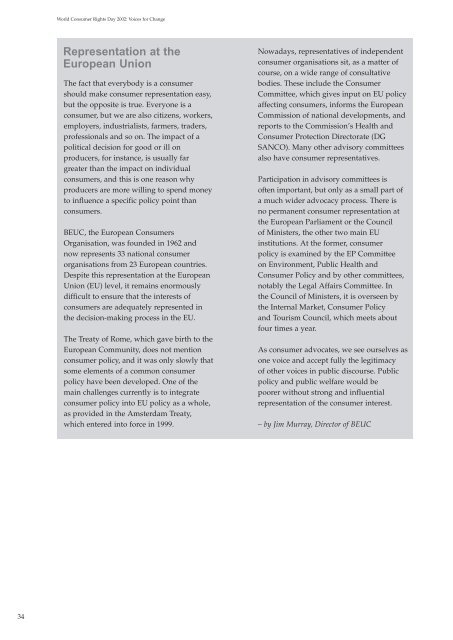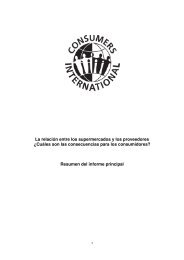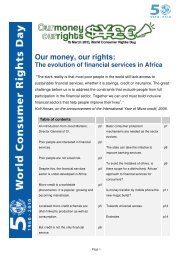Voices for Change: the Consumer Right to Representation
Voices for Change: the Consumer Right to Representation
Voices for Change: the Consumer Right to Representation
Create successful ePaper yourself
Turn your PDF publications into a flip-book with our unique Google optimized e-Paper software.
34<br />
World <strong>Consumer</strong> <strong>Right</strong>s Day 2002: <strong>Voices</strong> <strong>for</strong> <strong>Change</strong><br />
<strong>Representation</strong> at <strong>the</strong><br />
European Union<br />
The fact that everybody is a consumer<br />
should make consumer representation easy,<br />
but <strong>the</strong> opposite is true. Everyone is a<br />
consumer, but we are also citizens, workers,<br />
employers, industrialists, farmers, traders,<br />
professionals and so on. The impact of a<br />
political decision <strong>for</strong> good or ill on<br />
producers, <strong>for</strong> instance, is usually far<br />
greater than <strong>the</strong> impact on individual<br />
consumers, and this is one reason why<br />
producers are more willing <strong>to</strong> spend money<br />
<strong>to</strong> influence a specific policy point than<br />
consumers.<br />
BEUC, <strong>the</strong> European <strong>Consumer</strong>s<br />
Organisation, was founded in 1962 and<br />
now represents 33 national consumer<br />
organisations from 23 European countries.<br />
Despite this representation at <strong>the</strong> European<br />
Union (EU) level, it remains enormously<br />
difficult <strong>to</strong> ensure that <strong>the</strong> interests of<br />
consumers are adequately represented in<br />
<strong>the</strong> decision-making process in <strong>the</strong> EU.<br />
The Treaty of Rome, which gave birth <strong>to</strong> <strong>the</strong><br />
European Community, does not mention<br />
consumer policy, and it was only slowly that<br />
some elements of a common consumer<br />
policy have been developed. One of <strong>the</strong><br />
main challenges currently is <strong>to</strong> integrate<br />
consumer policy in<strong>to</strong> EU policy as a whole,<br />
as provided in <strong>the</strong> Amsterdam Treaty,<br />
which entered in<strong>to</strong> <strong>for</strong>ce in 1999.<br />
Nowadays, representatives of independent<br />
consumer organisations sit, as a matter of<br />
course, on a wide range of consultative<br />
bodies. These include <strong>the</strong> <strong>Consumer</strong><br />
Committee, which gives input on EU policy<br />
affecting consumers, in<strong>for</strong>ms <strong>the</strong> European<br />
Commission of national developments, and<br />
reports <strong>to</strong> <strong>the</strong> Commission’s Health and<br />
<strong>Consumer</strong> Protection Direc<strong>to</strong>rate (DG<br />
SANCO). Many o<strong>the</strong>r advisory committees<br />
also have consumer representatives.<br />
Participation in advisory committees is<br />
often important, but only as a small part of<br />
a much wider advocacy process. There is<br />
no permanent consumer representation at<br />
<strong>the</strong> European Parliament or <strong>the</strong> Council<br />
of Ministers, <strong>the</strong> o<strong>the</strong>r two main EU<br />
institutions. At <strong>the</strong> <strong>for</strong>mer, consumer<br />
policy is examined by <strong>the</strong> EP Committee<br />
on Environment, Public Health and<br />
<strong>Consumer</strong> Policy and by o<strong>the</strong>r committees,<br />
notably <strong>the</strong> Legal Affairs Committee. In<br />
<strong>the</strong> Council of Ministers, it is overseen by<br />
<strong>the</strong> Internal Market, <strong>Consumer</strong> Policy<br />
and Tourism Council, which meets about<br />
four times a year.<br />
As consumer advocates, we see ourselves as<br />
one voice and accept fully <strong>the</strong> legitimacy<br />
of o<strong>the</strong>r voices in public discourse. Public<br />
policy and public welfare would be<br />
poorer without strong and influential<br />
representation of <strong>the</strong> consumer interest.<br />
– by Jim Murray, Direc<strong>to</strong>r of BEUC






![pkef]Qmf eg]sf] s] xf] < - Consumers International](https://img.yumpu.com/6479658/1/184x260/pkefqmf-egsf-s-xf-consumers-international.jpg?quality=85)
